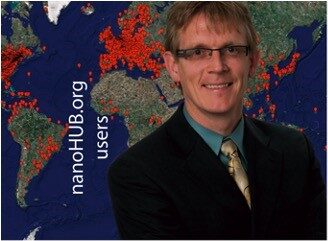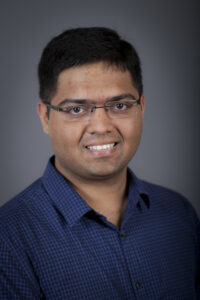IEEE Nanotechnology Council TC10 – Modeling and Simulation 2023 webinar series.
Organizer: Josef Weinbub, TC 10 Vice Chair, weinbub@iue.tuwien.ac.at
Format: 1 hour Webex webinars
Webinar 2
Date: October 12, 2023
Time: 16:00 PDT, 1:00 CEST, 08:00 JST
Speaker: Gerhard Klimeck, Professor and nanoHUB Director, Purdue University
Topic: nanoHUB for Research and Education in Nanoelectronics
Register below to receive meeting link
Abstract
Over 200,000 nanoHUB users have run over 7 million simulations in Apps mostly focused on semiconductor devices and materials modeling. These apps provide very simple and intuitive interfaces to community and research codes that are hard to install, operate, and to maintain even for experts. As such nanoHUB created the first end-to-end scientific cloud enabling users to focus on solving problems rather than installing and maintaining software (before “the cloud” was a thing). Any portal provides access, installation, and compute cycles, however, usability is most often neglected. Most scientific tools focus on solving “any” simulation problem in a specific problem range. Such comprehensiveness makes these tools usable by experts only, typically after intensive training. nanoHUB has instead focused on delivering a spectrum of apps that individually have a limited capability compared to the underlying toolset, but as a whole set cover a vast swath of problems. Hundreds of community members have contributed over 700 Apps into nanoHUB.
We assembled some of these Apps that are essential for specific courses into small sets such as ABACUS (crystals, bandstructure, drift-diffusion, pn-junctions, BJTs, MOScaps, MOSFETs) [1]. The usability results are stunning. Our user analytics prove that over half of the simulation users participate in structured education through homework/project assignments. We can identify classroom sizes and detailed tool usage [2,3]. We can begin to build mind-maps of design explorations and assess depth of explorations for individuals and classes. While parts of academia struggled to innovate curricula, we have measured the median first-time App insertion into a class to be less than six months. Over 180 institutions have utilized nanoHUB in their curriculum innovation in over 3,600 classes. 2 million nanoHUB visitors explore lectures and tutorials annually. Over 2,700 papers cite nanoHUB in the scientific literature resulting in 68,300+ secondary citations and an equivalent h-index of 121.
With such a community presence we believe nanoHUB is the platform of choice to deliver online modeling, simulation, virtual environments, and lectures for the US initiative on workforce development and chip design [4]. We are in the process to build chipshub.org as a group inside nanoHUB. Chipshub hosts commercial and open-source chip design tools and associated apps and learning materials. It is hosted in Purdue’s hardware cloud.
[1] https://nanohub.org/groups/abacus ABACUS – Assembly of Basic Applications for Coordinated Understanding of Semiconductors. A one-stop-shop for teaching and learning semiconductor fundamentals.
[2] Krishna Madhavan, Michael Zentner, Gerhard Klimeck, “Learning and research in the cloud”, Nature Nanotechnology 8, 786–789 (2013)
[3] TEDx Talk, Klimeck, “Mythbusting Scientific Knowledge Transfer with nanoHUB.org”, https://www.youtube.com/watch?v=PK2GztIfJY4 .
[4] https://chipshub.org
Speaker:
 Dr. Gerhard Klimeck is a Professor of Electrical and Computer Engineering at Purdue University; Director of the Network for Computational Nanotechnology; Reilly Director of the Center for Predictive Materials and Devices. He helped to create nanoHUB.org, the largest virtual nanotechnology user facility serving over 2.0 million global users, annually. Dr. Klimeck is a fellow of the Institute of Physics (IOP), the American Physical Society (APS), the Institute of Electrical and Electronics Engineers (IEEE), the American Association for the Advancement of Science (AAAS), and the German Humboldt Foundation. He has published over 525 printed scientific articles; he has been recognized for his co-invention of a single-atom transistor, quantum mechanical modeling theory, and simulation tools. His NEMO5 software has been used since 2015 at Intel to design nano-scaled design transistors. The nanoHUB team was recently recognized by a top 100 by R&D award – Making simulation and data pervasive.
Dr. Gerhard Klimeck is a Professor of Electrical and Computer Engineering at Purdue University; Director of the Network for Computational Nanotechnology; Reilly Director of the Center for Predictive Materials and Devices. He helped to create nanoHUB.org, the largest virtual nanotechnology user facility serving over 2.0 million global users, annually. Dr. Klimeck is a fellow of the Institute of Physics (IOP), the American Physical Society (APS), the Institute of Electrical and Electronics Engineers (IEEE), the American Association for the Advancement of Science (AAAS), and the German Humboldt Foundation. He has published over 525 printed scientific articles; he has been recognized for his co-invention of a single-atom transistor, quantum mechanical modeling theory, and simulation tools. His NEMO5 software has been used since 2015 at Intel to design nano-scaled design transistors. The nanoHUB team was recently recognized by a top 100 by R&D award – Making simulation and data pervasive.
Register for meeting link:


 Dr.
Dr. 